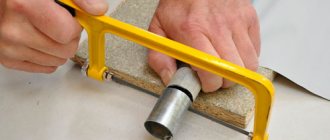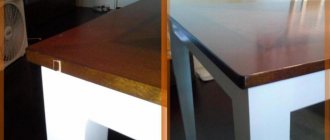Due to moving to a new apartment or for some other reason, sometimes you have to cut the curtains because of their length or replace them with new ones. This is especially true when they are in the kitchen, where short curtains are more suitable, or in a room with low ceilings. There is a great option for such cases. You can shorten curtains without cutting them. And this is actually a creative idea. Because there are many ways to shorten curtains without trimming. They are quite interesting and enjoyable for creative people. This article will present some methods and recommendations on how you can shorten curtains without cutting them. They are very easy to perform even for a beginner in this matter.
Does it need to be shortened?
The first and most important question to understand is: do you need to shorten the curtains at all? Most often, yes. Because usually the ceilings are not so high in apartments that long curtains decorate the room. Another problem is dust that accumulates at the bottom. If you want to leave them long, then you should do this only in the bedroom or in the living room, where there is less dust and children do not run around. The advantage of not cutting the curtains is that the fabric remains intact. If necessary, you can always return it to its original length. Based on all this, many will decide to shorten the curtains. What are the options? Let's look at them below.
home_and_garden
Stylish and comfortable home
Curtains lying on the floor. To be or not to be?
How long should curtains be? to the floor? to the windowsill? Why in the photos on the Internet are the curtains lying on the floor? Firstly, the most important rule is that your curtains, like your children, like you personally, don’t owe anyone anything. They have every right to be the length that is comfortable and visually pleasing to you. If you like curtains that lie on the floor in beautiful, spectacular folds, this is a reason to sew curtains this way. If instead of beautiful warehouses you see “dust collectors,” then you need to make curtains just above floor level. If you don’t yet know exactly how you need and what you want, the reasoning below may come in handy. These are not dogmas or laws, but practical observations.
There are two fundamentally different length options for curtains: 1. Curtains up to the window sill. Most often, this choice is dictated by the design features of the room: there is a sofa close to the window, and the lower part of the curtains will be behind it. The heating radiator is covered with a decorative grille; there is no need to hide such beauty behind curtains. The window sill goes into the tabletop, making curtains to the floor is not going to work. The room is small, it’s cramped, I want there to be as few curtains as possible. In all these cases we need to reconcile utilitarian necessity with aesthetics. It needs to be done so that it is both convenient and beautiful. But first of all, it’s still convenient. It is important to remember that the proportions of the window set are perceived not by the contours of the actual window opening, but by the outlines of the curtains themselves. Those. a curtain up to the window sill makes the window visually more “squat”.
In my opinion, Roman blinds would be a good solution for decorating such windows.
Austrian/French curtains
Cafe style curtains
2. Curtains to the floor The most common solution is curtains that do not reach the floor level by 0.5-1.5 cm. That is. almost touch the floor, create a slender silhouette of the window, but do not touch the floor
I once came across a discussion about a beautiful room with curtains that did not reach the floor by about the height of the baseboard. Proponents of this option believed that a beautiful baseboard should not be covered with curtains. As another advantage of this length, it is generally accepted that the curtains get dirty less and do not interfere with cleaning the floor. On the other hand, this length of the curtains may lead to thoughts that: the measurements were wrong, the curtains turned out to be short; these were ready-made curtains, standard size, and making an individual adjustment was a hassle; The curtains shrank after washing.
There was a discussion in interiors-ru, maybe someone still has the link? I would be grateful.
3. Curtains lying on the floor. The allowance for lying on the floor can be different, from 2-3 cm (if you only need to outline the silhouette) to 30-50 cm (if you need to form the volume of fabric on the floor) Why do they even lay curtains on the floor? What's the point of this? Firstly, many people think it is beautiful. a kind of slight negligence. A little “irregularity” reduces pretentiousness and at the same time takes the perception of the interior beyond the boundaries of strict utilitarianism. For interior owners, this is a way of easy, ironic communication: yes, these are just curtains. nothing that lies on the floor. but it's beautiful. Considerations of practicality are not in the first place for us. yes, we can afford it. If we draw analogies with clothing, it’s like women’s floor-length trousers/skirts. As opposed to short trousers, for which it is important not to get dirty.
Secondly, this length saves you from the need to accurately calculate the height of the curtains. Let me clarify that if you don’t like the curtains lying on the floor, then you should still take care of the correct sizes. It is not difficult. Exception for windows of complex shapes. Here the fabric can behave in an unpredictable way; it is often better to immediately lay the curtains on the floor
Thirdly, this length insures you against the fact that after dry cleaning the curtains will be “shot.” The permissible percentage of shrinkage for fabrics with a high content of natural fibers is approximately 3%, i.e. a curtain 2800 mm long has the right to become 8 cm shorter. If you do not want to lay the curtains on the floor, and the prospect of getting short curtains after dry cleaning is also not ok, just ask the studio to make a larger allowance for the curtain tape. This supply of fabric will allow (if necessary) to lengthen the curtains.
Magnets to the rescue
For the first option, you will need magnetic holders. They need to be attached close to each other and create festoons from the curtains. Then attach the material to the magnet. To make your work easier, you can first sew them tightly and secure them. How to shorten curtains without cutting them? Photo examples can be found in our article to see the final result. The advantage is that the light source opens, and the room becomes much more comfortable and warmer (especially if it is on the sunny side). This method will also give a chic look to the room. You also need to take into account one subtlety - the higher the fabric is, the wider the window appears. And the lower the curtains are, the narrower the window appears. You can act in accordance with the result you want to achieve.
Zigzag stitch
Using a zigzag stitch, you can quickly hem the tulle from the bottom. The work is carried out in several stages:
- Turn the edge in at least 10 millimeters.
- Run the iron along the hem.
- Set the necessary parameters on the sewing machine: thread length, tension, stitch size.
- Finish the edge of the curtain with a zigzag stitch.
- Remove excess fabric using sharp scissors.
The simplest pins
This is a very elegant and elementary way. You just need to raise both ends of the curtains so that they reach the middle of the window. To do this, you need to have a thread and a needle on hand. Safety pins for notes also work well.
You need to raise the curtains on both sides until it looks nice. After this, you just need to stick the needles into the folds. If there is a need or desire, then you can also sew it all on, but so that the seams are on the inside. And to make the curtains look even more aesthetically pleasing, you can iron the edges. The reader can see an example of such work in the photo above.
Bias tape
This processing option is more suitable for mesh and embroidered fabrics. You can buy bias tape at a fabric store. For hemming, a snail foot or a special foot is used. The work is performed in the following sequence:
- Cut the tulle to the required length.
- Place the cut into the binding.
- If you have sewing experience, you can start processing without basting the fabric. But it’s better to baste or secure the tape with pins.
- Start sewing the binding on using a straight stitch. While working, it is recommended to stop from time to time and check the quality of the seams on both sides.
- Hold the fabric with your hands, it will be easier for you to control the seam.
- If the stitching is done evenly, you will get a beautiful tulle edge.
How to shorten curtains without cutting them in the kitchen?
This method will look beautiful on short curtains. Its essence is that a maximum of four folds are made vertically. Now you can start working step by step:
- Break the curtains into three equal parts. You can make marks to make everything look more professional.
- Secure them with pins.
- These places should be sewn up. A regular seam is used.
- Once the fold of the desired height and size is ready, you can pierce it with a needle and bring the seam out beyond the fold.
- A good option is to hide the fold in the seam to get the effect of embossed curtains. These curtains are ideal for a large hall or living room.
It's worth noting that you may need to experiment a bit with the fabric to see what height and width works best. This is done individually and in terms of taste preferences, as well as depending on the material of the curtains. If the latter are too heavy and thick, then most likely you should not lift them too much.
Put it on glue: instructions for use
The easiest way to shorten a curtain is with a special adhesive tape. Its types are described a little higher. The following are instructions for use:
- the length of the braid should correspond to the length of the edge of the curtain; if it is longer or shorter, nothing good will come of it, you should pay close attention to the measurements;
- first, a fold is formed at the end of the curtain: for stability, it is treated with a hot iron, so the bend is securely fixed in the chosen place;
- An adhesive tape is placed in the fold or at the end of the curtain, and then passed over the entire “structure” with a hot iron. High temperature activates the adhesive, it sticks to the fabric and quickly hardens in air.
Important: this processing method is not suitable for all fabrics. For the glue to work, the iron must be really hot, not lukewarm. Organza or thin tulle will not withstand heat treatment, so adhesive tape is not suitable for them.
If the tape is attached correctly, it will not be noticeable to strangers and others
French curtains
The next method is suitable for those who have a sewing machine and experience using it. You will need a transparent type of curtain tape. The main advantage of this method is that it is convenient for heavy and thick curtains. The tape is needed to cover any seams that may be visible. Especially if they are located in the hall or living room, in the most visible place for guests.
So, to implement this method, you need to collect the curtains in three places and use a sewing machine to go over them, creating layers on both sides. The result should be four or five layers on each side.
Preparatory work
Before work, cover the table with a cotton cloth - this will reduce the sliding of the curtain on the surface.
It is recommended to hem very thin material on tissue paper. After completing the stitch, the paper simply comes off.
Before you start working on your sewing machine, stitch a little on a small unnecessary piece of tulle. If necessary, adjust the stitch length and thread tension. The seams are made with a straight stitch with an average step length (3-4 mm).
For double curtains
This option is suitable for those who have a double layer of curtains and at the same time contrasting colors. This method shows how to decoratively shorten curtains without cutting them. Here everything is done in the same way as in the previous method. Only the curtains need to be rolled up so that they look elegant. That is, turn them 90 degrees.
Ruffle decoration
This simple method will come in handy if the room is decorated in a romantic or country style. Before making the elements, the width of the curtain is measured, and the result is multiplied by 2. Then a strip of this length is cut out, the width is 10 cm, but it depends on the number of ruffles and centimeters that the curtains lack; seam allowances are added to this figure.
- Stepping back 2 cm from the edge of the strip, the material is basted in one thread.
- Make an assembly of the same length as the width of the curtain, and secure the ends of the thread.
- Baste the ruffles to the bottom edge of the curtain and sew a machine seam. If there is a desire or need, the seam is hidden under lace ribbons.
This option is picky about the fabric for the frills. In color and texture, it must be in harmony with the material of the curtains. If a bold, contrasting solution is chosen, then some decorative element of the same color should be present in the upper part of the curtains.
The length is the same, but the result is gorgeous
There is another ingenious way to shorten curtains, but in this case, most likely, visually. If you secure the curtains in the middle with a nice knot, you will get a great curtain outfit. Only this is suitable for thin curtains, because it will look very ugly on heavy ones.
There is another option for attaching curtains, but not visually. This is suitable for those who have long curtains. How to shorten them without cutting them:
- If the curtains have not yet been installed, then they need to be hung and left for a while to smooth out.
- Then you will need a thick needle and wool fabric. The color depends on the color of the curtains and the overall design of the room.
- You need to start from the middle of the curtains, first to the right, then to the left. Then roll the bottom fabric into a roll and secure it with threads that are tied in a knot.
- Such curtains are convenient because they can be rolled back and then returned to their shape.
Side edges
First we process the side edges of the curtain.
- The edge should be trimmed evenly and smoothed.
- We place the tulle with the wrong side up, fold the hem 1-2 cm. Smooth it with an iron.
- Then fold the edge again by 1-2 cm and iron it. This way we get a double hem.
- To make the material slip less, you can fix it with pins before ironing.
- We sew the seam on the machine at a distance of approximately 1-2 mm from the edge of the hem.
We process the second side edge of the curtain in the same way.
Intricate and original
There is a very interesting option on how to shorten curtains beautifully, without cutting, but creating a beautiful pattern on the curtains. What will you need for work? First of all, you need curtains, and then thread, needle and scissors. How to do it? Very simple:
- The curtains do not need to be removed from the curtain rod, and if they are not already hanging, it is better to install them. The work is easier if they are not slack.
- You need to start stitching with a regular seam from the edges of the curtains, retreating five centimeters. The seam starts from the middle and goes down in a straight line. The most important thing is to round the corner at the end. Do the same on the other edge of the curtains.
- Then you need to start sewing in the middle. Find the very middle of the curtains and start stitching twenty centimeters higher than from the sides.
- It is important to remember that the thread cannot be secured at the beginning and torn off during the process. Because at the very end you need to pull it. And then all the folds and patterns will appear instantly.
- You just need to arrange all the folds in a beautiful way.
The same can be done not by hand, but with a sewing machine, if you set it to the maximum step. This way you can create curtains of the desired height quickly and efficiently.
Kisey, or thread curtains: we knit, pull and still cut
Thread curtains are a real gift for any interior. This is both a decoration that can transform a room and a practical choice when washing is very easy and ironing is not required at all. And it’s very easy to shorten such curtains with your own hands. The thread “waterfall” is always made in such a way that it does not crumble, even if it is cut off.
Option 1. Neat cut
You need to hang the thread structure on the cornice and simply cut the threads at the desired height. It is best to cut the threads exactly to the floor. To do this, pull up some of the threads with your hand, secure it in tension with a ruler, and cut, focusing on the ruler. It is not necessary to make the cut perfectly even. You can cut a jagged or wavy outline. But for this you need to have a good eye and sharp scissors so that the threads have a neat cut.
Option 2. Pickups and cascades
Thread curtains look very impressive when picked up. A cascade of threads creates a window dress of unique beauty. We simply intercept the thread curtains in the middle with a contrasting long ribbon or braid. Raise the ends of the tape to the desired height and secure them to the cornice. How do you like this thread “fountain”? The place of the knot can be decorated with a suitable bow or flower.
Fantasies with muslin curtains - knots, tiebacks, fountains
Option 3. Spectacular knot
The same node as in the example above. It will look very impressive.
So you are convinced that for a housewife with a healthy ingenuity, there are no hopeless everyday situations. You just need to direct your imagination in a constructive direction. You can now easily remove excess length of window textiles with your own hands, even without being a skilled craftswoman.
Previous post 8 ways to lengthen curtains if they are short
Next entry Multi-textured various blinds, application in the interior
How to hem tulle evenly by hand without a sewing machine
If you decide to hem the curtains yourself, but you don’t have a sewing machine at home, this option will suit you. To finish the edges, use a needle-forward stitch. This is a simple basting stitch. The main thing is that the stitches are the same length.
This seam consists of stitches and passes. Stitches can be made from right to left or left to right. Secure the thread at one edge of the fabric. Sew one stitch approximately 5mm long. Make the second stitch from the wrong side.
Seamless ways to shorten tulle
You can quickly shorten long curtains by hand using adhesive tape. Excess fabric will need to be placed between layers of tape and ironed.
If this is your first time working with adhesive tape, experiment on a scrap piece of fabric before you start shortening the curtains.
You can also use special clips to shorten curtains.











